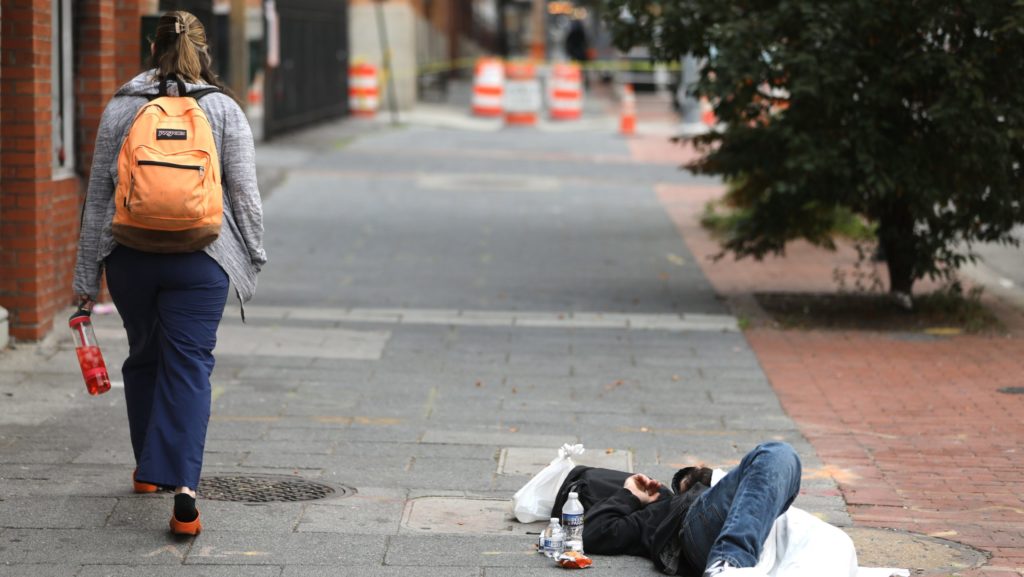Like most of us, I long with all my heart to serve “the poor.”
Bitter experience has shown that soup lines and bandaging are not my forte. My realm leans more toward the spiritual work of mercy.
In my imagination, such an interchange would consist of an alert supplicant, hungry for wisdom, who comes with a clear, concise question or situation, then raptly listens.
Instead, also as I suspect is true of most of us, the people who need help are often a version of the poorest of the poor: the disordered, the directionless, the scattered, the confused, the hopelessly entangled in chaos in so many directions and on so many levels that I’ve been known to throw up my hands in despair (and I’m ashamed to say, often annoyance) and simply flee.
If I’m going to expend some of my precious energy and time, I want to use it on a person with some promise!
Can you imagine if that’s how Jesus approached us?
From an essay by Father Ron Rolheiser called “Unnoticed Blood”:
“Nearly one hundred years ago, as Thérèse of Lisieux lay dying, she told her sister, Pauline, that the entire foundation of her spirituality came from her contemplation of the face of the suffering Christ (“the Holy Face,” she called it). She described to her sister how she was always struck by the Good Friday texts (from Isaiah and from the Gospels) that describe the face of God’s suffering servant on earth, how that face is marred, unattractive, and either ignored or despised by those who see it.
“Therese then tells Pauline: ‘One Sunday, looking at a picture of Our Lord on the Cross, I was struck by the blood flowing from one of his divine hands. I felt a pang of great sorrow when thinking this blood was falling to the ground without anyone’s hastening to gather it up. I was resolved to remain in spirit at the foot of the Cross and to receive its dew.’ In a later conversation, she adds: ‘I don’t want this precious blood to be lost. I shall spend my life gathering it up for the good of souls … for ‘to live from love is to dry Your Face.’ ”
Christ bleeds through the poor: the weak, the sick, the suffering in all of us. Let’s not let a drop of that be wasted. Let’s not let a drop of that fall to the floor unnoticed. No, we can’t “fix” the poorest of the poor: they will always be with us. We can’t untangle, uproot, and cure every disorder, trauma, or wound.
But we can give a drop of water in exchange for a drop of Jesus’s precious blood. Instead of averting our faces — or worse, thinking, “They don’t want to be healed; they don’t want to help themselves” — we can metaphorically stand for a moment at the door of the prison cell, sit for a moment on the edge of the sickbed, give our coat to the person who is cold.
Long enough to say a Hail Mary, and to whisper, “Help our brother, help our sister.” Long enough to ask ourselves: Could I make a financial donation? Better yet, could I devote an hour of prayer for this person before the tabernacle this afternoon, morning, or evening?
Better yet, could I simply set aside 20 minutes, sit before this person, and hear them out? Could I just listen?
In “The Pain of Christ and the Sorrow of God,” a largely forgotten gem from 1947, Father Gerald Vann, OP, wrote:
“The death that leads to resurrection is not just a death, but a sacrificial death, a death turned into an act of love and self-giving. You have your pain and your sorrow, your anxieties, your personal problems, your moral lapses, perhaps your loss of faith: turn these into the sign of Jonas the prophet, use these to lead you down into the darkness, take these to the altar of love and tumble them into his hands and ask him to deal with them, like a little child taking a worthless piece of treasure trove as a gift to its mother.
“And not your own sorrows and your own sins merely, but the sorrows and sins of the world: you who should be so powerful to heal them in the might of Love and who in fact are so powerless to do anything, take these too and give them to him, make these too an act of sacrificial love, suffering for them yourself in union with his sorrow; and so, having seen to the very depths of your own ineffectiveness, you will cease to be ineffective. You will begin to live, now not you, but Christ living in you.”
Even to refrain from shutting our eyes, putting our hands over our ears, or closing our hearts is a step in the right direction. In other words: Something rather than nothing, a crack in the door.
Because it’s not the exterior act that avails. It’s the conversion of heart by which we are not just mouthing the words, “Please help our brother,” but rather seeing and feeling to the marrow of our bones that this truly is our brother.
It’s acknowledging that it’s not the poor we can’t bear, but rather our own powerlessness, our own darkness, our own poverty.
To realize that we are all the undeserving poor is the mustard seed Jesus speaks of in Matthew 13:32 — when it is grown it becomes a large bush, and the birds of the air come and sing in its branches.

